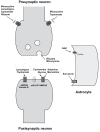Glutamate-Modulating Drugs as a Potential Therapeutic Strategy in Obsessive-Compulsive Disorder
- PMID: 28322166
- PMCID: PMC5652017
- DOI: 10.2174/1570159X15666170320104237
Glutamate-Modulating Drugs as a Potential Therapeutic Strategy in Obsessive-Compulsive Disorder
Abstract
Objective: Obsessive-compulsive disorder (OCD) is a mental disease commonly associated with severe distress and impairment of social functioning. Serotonin reuptake inhibitors and/or cognitive behavioural therapy are the therapy of choice, however up to 40% of patients do not respond to treatment. Glutamatergic signalling has also been implicated in OCD. The aim of the current study was to review the clinical evidence for therapeutic utility of glutamate-modulating drugs as an augmentation or monotherapy in OCD patients.
Methods: We conducted a search of the MEDLINE database for clinical studies evaluating the effect of glutamate-modulating drugs in OCD.
Results: Memantine is the compound most consistently showing a positive effect as an augmentation therapy in OCD. Anti-convulsant drugs (lamotrigine, topiramate) and riluzole may also provide therapeutic benefit to some OCD patients. Finally, ketamine may be of interest due to its potential for a rapid onset of action.
Conclusion: Further randomized placebo-controlled trials in larger study populations are necessary in order to draw definitive conclusions on the utility of glutamate-modulating drugs in OCD. Furthermore, genetic and epigenetic factors, clinical symptoms and subtypes predicting treatment response to glutamate-modulating drugs need to be investigated systematically.
Keywords: Obsessive-compulsive disorder; clinical subtypes.; glutamate; glutamate-modulating drugs; memantine; treatment response.
Copyright© Bentham Science Publishers; For any queries, please email at epub@benthamscience.org.
Figures
References
-
- Fineberg N.A., Hengartner M.P., Bergbaum C.E., Gale T.M., Gamma A., Ajdacic-Gross V., Rössler W., Angst J. A prospective population-based cohort study of the prevalence, incidence and impact of obsessive-compulsive symptomatology. Int. J. Psychiatry Clin. Pract. 2013;17(3):170–178. [http://dx.doi.org/10.3109/ 13651501.2012.755206]. [PMID: 23205952]. - PubMed
-
- Kalra S.K., Swedo S.E. Children with obsessive-compulsive disorder: are they just “little adults”? J. Clin. Invest. 2009;119(4):737–746. [http://dx.doi.org/10.1172/JCI37563]. [PMID: 19339765]. - PMC - PubMed
-
- Ruscio A.M., Stein D.J., Chiu W.T., Kessler R.C. The epidemiology of obsessive-compulsive disorder in the National Comorbidity Survey Replication. Mol. Psychiatry. 2010;15(1):53–63. [http://dx.doi.org/10.1038/mp.2008.94]. [PMID: 18725912]. - PMC - PubMed
-
- Timpano K.R., Rubenstein L.M., Murphy D.L. Phenomenological features and clinical impact of affective disorders in OCD: a focus on the bipolar disorder and OCD connection. Depress. Anxiety. 2012;29(3):226–233. [http://dx.doi.org/10.1002/da.20908]. [PMID: 22109969]. - PMC - PubMed
-
- Saxena S., Rauch S.L. Functional neuroimaging and the neuroanatomy of obsessive-compulsive disorder. Psychiatr. Clin. North Am. 2000;23(3):563–586. [http://dx.doi.org/10.1016/S0193-953X(05)70181-7]. [PMID: 10986728]. - PubMed
Publication types
MeSH terms
Substances
LinkOut - more resources
Full Text Sources
Other Literature Sources
Medical

